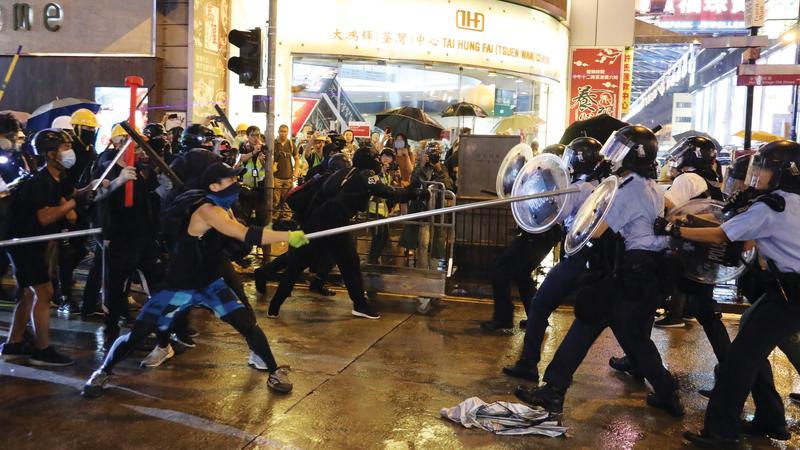There's still a glimmer of hope amid months of turmoil
By Paul Yip | China Daily Asia | Updated: 2019-12-13 09:08

The anti-extradition-bill protests have seen conflicts erupt between the police and protesters, which have, for the past six months, become a part of daily life for people in Hong Kong. Almost every district has become a stage for the battle between bricks and tear gas, gasoline bombs and pepper spray. The police estimated they have fired more than 12,000 rounds of tear gas since the protests began, with a record of over 1,000 fired in a single day. If the deadlock continues between both sides, it can only be a lose-lose situation.
Who wouldn't like to restore Hong Kong if they can, be it her core values or beautiful surroundings? What other alternatives are there to maintain order, besides fist for a fist and violence for violence? What remains of sense and reason?
Over the past few months, political events have turned the police and protesters against each other, giving rise to a lot of hatred and hostility. Both sides are under tremendous mental stress, and when emotions run high, they may take over reason. Negative emotions such as depression, panic, anxiety and post-traumatic stress disorder can suddenly attack, resulting in decisions that lead to irrevocable loss. Regardless of which side you are standing on, we need to better manage our emotions during this critical period.
"We shouldn't be feeling happy because everything is good; rather, we should be happy because we see the good in everything."
Despite societal tension over the past few months, we can still look for the good in between the bricks and tear gas. In August, a group of protesters surrounded Ma On Shan police station, pointing laser beams at the police officers inside the station. A police officer attempted to communicate with the protesters over a microphone. Speaking firmly but gently, he said, "The penalties for unlawful assembly and criminal damage will be enough to keep you in jail for the rest of your youth. By the time you are released, it would be a different world. Do you really think it is worth to pay such a huge price?" The conversation was subsequently dubbed "an affectionate dialogue in laser", and the police officer was given a nickname for his deep and smooth voice. He urged the protesters not to risk their futures by committing unlawful acts, and to think about their parents who supported them and the friends on their phones. Eventually, his sincerity touched the protesters.
One early morning in October, an anti-riot police officer in Mong Kok persuaded the demonstrators on the street to leave. Acknowledging that everyone has had a tough time, the police officer urged the demonstrators to be good and give him some face. A civilian shouted "Sir, I love you!" in response to the police officer's politeness. The police officer immediately responded by saying that was not necessary. This police officer was later nicknamed "Supper Sir". Because he has chosen an alternative method in between bricks and tear gas to communicate with the protesters respectfully, the protesters were cooperative and dismissed themselves in an amicable atmosphere. During the Polytechnic University incident, following scene after scene of heart-stopping conflict, everyone was worried that something terrible would happen. Fortunately, the police did not flush out the protesters by force but provided medical and humanitarian support, hoping to resolve the matter peacefully. The police allowed students under the age of 18 to leave while accompanied by their secondary school principals, demonstrating yet another alternative in between bricks and tear gas. The PolyU siege is over, but leaves much damage to be repaired.
The results of this year's District Council elections were roundly against pro-establishment candidates. Rather than a sign of tolerance of violence, it is a penalty vote for the current government and for the way it has handled the whole extradition matter. The government needs to learn to administer more effectively without relying solely on the support of the pro-establishment camp. It needs to gain the approval of the wider public and people with differing political stances. On the other hand, the author believes that hatred will only bring more damage, and violence will only cause more injuries. A number of young candidates have said, "If we burn, you burn with us." Now that they are elected, our citizens hope to see them fix the system for the better, build up good relations with the community, and bring progress to society. Further violence, disruption and vandalism would not add much value to the movement; it is the time for the pro-democratic candidates to demonstrate they actually can deliver the goods and for the betterment of Hong Kong on the district level.
Hong Kong is a blessed land that has weathered numerous storms over the years and nurtured generations of Hong Kong people who are all tied together, regardless of their political stance. As long as we work together, we believe we can find more effective, sensible, civilized and peaceful alternatives other than bricks and tear gas. Together, we can weather through the storms and restore Hong Kong.
The author is a chair professor (population health) at the University of Hong Kong.
The views do not necessarily reflect those of China Daily.
























